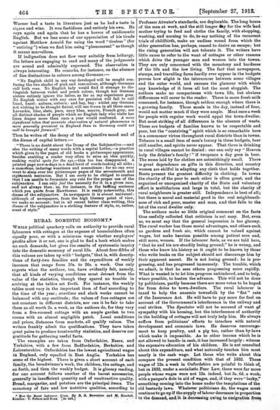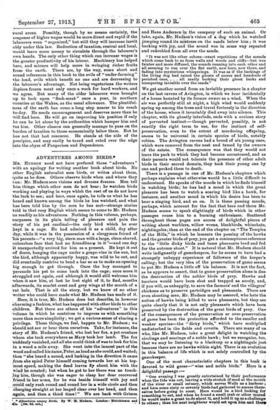RURAL DOMESTIC ECONOMY.*
WHILE political quackery calls on authority to provide rural labourers with cottages at the expense of householders often equally poor, or with a minimum wage whether employers' profits allow it or not, one is glad to find a book which makes no such demands, but gives the results of systematic inquiry into the domestic economy of rural life. About four-fifths of this volume are taken up with "budgets," that is, with descrip- tions of fortj,-two families and the expenditure of weekly incomes that range from 10s. to 26s. a week. One only regrets what the authors, too, have evidently felt, namely, that all kinds of varying conditions must detract from the value of the statistics, though they spared no trouble in arriving at the tables set forth. For instance, the weekly tables must vary in the important item of fuel according to the time of the year ; overtime and slack weeks cannot be balanced with any certitude; the values of free cottages are not constant in different districts, nor can it be fair to take them as all worth 2s. a week, as the authors do, for they vary from a five-roomed cottage with an ample garden to two rooms with an almost negligible patch. Local conditions and prices, distances from markets, all qualify values. The writers frankly admit the qualifications. They have taken great pains to produce trustworthy statistics, and deserve our gratitude for gathering useful facts.
- The examples are taken from Oxfordshire, Essex, and Yorkshire, with a few from Bedfordshire, Berkshire, and Leicestershire. Oxfordshire has the lowest agricultural wages in England, only equalled in East Anglia. Yorkshire has some of the highest. There is given a short account of each family, the breadwinner's work, the children, the cottage, and .so forth, and then the weekly budget.. It is gloomy reading, for one account follows another of the barest necessaries, generally in insufficient quantity and of unattractive quality. Bread, margarine, and potatoes are the principal items. The monotony of fare and low nutritive qualities, according to • lloto the Rural Labourer Lives. By B. -S. Bowntree aid M. Kendall. London: T. Nelson aid Sins: I2e.rtief..]'
Professor Atwater's standards, are deplorable. The long hours of the men at work, and the still longer dlky for the wife fend mother trying to feed and clothe the family, with shopping, washing, and nursing to do, to say nothing of the recurrent trials of childbirth, make an endless round from which the older generation has, perhaps, ceased to desire an escape; but the rising generation will not tolerate it. The writers have little cause to refer to the want of cottages or other reasons which drive the younger men and women into the towns. They are only concerned with the monotony and hardness of the life and the low living. The fact that newspapers, stamps, and travelling fares hardly ever appear in the budgets proves how slight is the intercourse between some villages and the outer world, and excuses the glamour with which any knowledge of it lures all but the most sluggish. The authors make no comparisons with town life, but obvious differences will occur to the reader. There is more fresh milk consumed, for instance, though seldom enough where there is a growing family. Three meals in the day, instead of four, would not matter much if they were ample. Meat once a week for people with regular work would appal the town-dweller. But most striking of all differences is the absence of waste.
These are budgets of families known to be respectable and poor, but the "contriving" spirit which is so remarkable here is a commoner virtue throughout rural districts than in towns. Tobacco is a small item of men's luxury in these budgets, beer still smaller, and spirits never appear. That there is drinking in rural villages cannot be denied : one can only say "Heaven help the drinker's family ! " if twopence a day goes in beer.
The sums laid by for clothes are astonishingly small. There is great dependence on gifts in this direction, and country women are skilful in adapting any cloth that holds together.
Boots present the greatest difficulty in clothing. In towns the charity of the poor to each other is often great, and the organized or unorganized charity of the State and voluntary
effort is multifarious and large in total, but the charity of rural neighbours is greater still. Independence is best of all; but there is moral and material good in the real neighbourli- ness of rich and poor, master and man, and that falls to the- lot of the rural dweller only. -
The authors make so little original comment on the facts thus usefully collected that criticism is not easy. But, even so, we must say that the general impression is too gloomy.
The rural worker has those moral advantages, and others such as gardens and fresh air, which cannot be valued against wages, but make heroism possible among patient men and, still more, women. If the labourer feels, as we are told here, "that he and his are steadily losing ground," he is wrong, and those who know his history as it ought to be known by those who write books on the subject should not discourage him by their apparent assent. He is not losing ground : he is pro- gressing, and has progressed immensely. The trouble, which we admit, is that he sees others progressing more rapidly. What is wanted is to let him progress unhindered, and to help, where possible, to hasten the advance. This will not be done by politicians, partly because there are more votes to be hoped for from doles to town-dwellers. The rural labourer is taxed to help the anaemic townsfolk by the "flat" rate of the Insurance Act. He will have to pay more for fuel on account of the Government's interference in the railway and
coal strikes. The Spectator will not be accused of want a
sympathy with his housing, but the interference of authority in the building of cottages will not truly help him. He always suffers from politicians' efforts to interfere with natural development and economic laws. He deserves encourage- ment to keep poultry, and a pig too, rather than by-laws which make it impossible. As to other income which be is not allowed to handle in cash, it has increased largely witness the expensive education of his children. He is not consulted about this expenditure, and what naturally touches him most nearly is the cash wage. Let those who write about this compare the present condition with that of 1832. These
wages of 12s. a week in Oxfordshire are painful to think of, but in 1832, under a socialistic Poor Law, there were far more people whose wages were not 12s. indeed, but Sc. 6d. a week, with a pauper's dole in aid of wages, and, if- they were "lucky," something coming into the home under the temptations of the old bastardy laws. Whatever politicians do, the wages must continue togo up if the supply of labour decreases in proportion- to the demand, and it is decreasing ()Rehm to emigration from, rural areas. Possibly, though by no means certainly, the response of higher wages would be more direct and rapid if the labourers were "organized," but still they will increase inevit ably under this law. Reduction of taxation, central and local, would leave more money to circulate through the labourer's own bands. The only other thing which can increase wages is the greater productivity of his labour. Machinery has helped here, and science will help more in wringing richer fruits from the earth. There are, by the way, some short and sound references in this book to the evils of "under-farming" The land, evils which benefit no one and are decreasing to the labourer's advantage. Not being vegetarians the writers deplore frozen meat only once a week for hard workers, and we agree. But many of the older labourers were brought -up to look upon " flesh-meat " once a year, in northern counties at the Wakes, as the usual allowance. The plentiful- ness of the earth has come a long step nearer to his reach to-day. He needs encouragement and deserves more than he will find here. He will go on improving his position if only lie can be let alone by the authorities which hamper him and tax him. Other classes can generally manage to pass on the burden of taxation to those economically below them. But he has not that last resource. He stands at the side of the precipice, and may easily be taxed and rated over the edge into the abyss of Pauperism and Dependence.











































 Previous page
Previous page